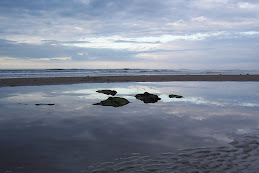We had our local Humber-Ouse-Tweed Lapidus (http://www.lapidus.org.uk/) meeting on Saturday. This time a small (but select) group and this time in Durham. We happily spent time being inspired by the cathedral precincts and then shared our work, sparking off discussions which ranged from performance poetry to what is 'acceptable' to write about in poetry to the 'I' in poetry. What a pleasurable time and what a tonic at the end of a couple of challenging weeks.
I re-visited the chapel where I got married, St Mary-the-Less (why the Less? Who was the More?) and discovered a memorial to two 17th century women.
This is by no means a finished 'piece', however it catches the moment:
Wood absorbs.
Stone is cold,
gritty, gouged,
cold stone.
Hollowed out
and cold
is stone
of sand
from seabeds long parched
or sunk deeper into rifts.
Mouths gape
in stone
gouged from sand,
crumbling into crystals
once more.
Dorothy and Frances Carnaby
scored into
fossil strewn plaque,
a memory of deaths
centuries old encrusted with
sea creatures
buried a millennium
commemorated
where love, young and vital, blazed.
Wood absorbs the sun's heat
warming my shoulders and my elbow.
Tuesday
Recently I was lucky enough to go to Sadlers Wells to see Matthew Bourne's 'Play without Words'. I found the title a little strange, isn't all dance a play without words? Though for sure this one had more narrative in a traditional sense than other contemporary ballet I've seen.
I really enjoyed the performance, the movement, the story telling, the staging and the revolving set. I was particularly taken by the use of two or three dancers to play one character at the same time. An innovative way to explore the fragmented self, as well as alternative plot lines, something contemporary writers are often intrigued by too.
I really enjoyed the performance, the movement, the story telling, the staging and the revolving set. I was particularly taken by the use of two or three dancers to play one character at the same time. An innovative way to explore the fragmented self, as well as alternative plot lines, something contemporary writers are often intrigued by too.
On Saturday, I went to a presentation by Felix Hodcroft, a good friend and a poet with The Valley Press (http://www.valleypressuk.com/). He was talking about poetry and, drawing on a quote from Kafka, said that a poem should 'take an axe to the frozen sea inside us'. In other words it should have impact; touch us; change the way we look at things; take us to other places and realms; make the ordinary extraordinary and the extraordinary ordinary.
He gave an interesting explanation of the 'battlefield' between the pastoral, formulaic 'Georgian' type poets and the ironic and obscure 'modernist' sort. Suggesting this conflict had resulted in poetry becoming thought of as elitist and irrelevant to the general run of life.
And yet, we reach for poetry at the most significant times in our lives, to celebrate or to mourn, to mark in some way. At times like these, I think we get in contact with our primal instincts to sit and hold hands and sing out our pain or our joy, just as our ancestors did. We find the sacred once again in a language which has rhythm, metaphor and a distillation of our humanity.
He gave an interesting explanation of the 'battlefield' between the pastoral, formulaic 'Georgian' type poets and the ironic and obscure 'modernist' sort. Suggesting this conflict had resulted in poetry becoming thought of as elitist and irrelevant to the general run of life.
And yet, we reach for poetry at the most significant times in our lives, to celebrate or to mourn, to mark in some way. At times like these, I think we get in contact with our primal instincts to sit and hold hands and sing out our pain or our joy, just as our ancestors did. We find the sacred once again in a language which has rhythm, metaphor and a distillation of our humanity.
Another week and I am continuing to work on my book on writing blocks in the academic environment.
I have got into a pretty good rhythm and I am happy with what I am doing. On the other hand, when I look at the whole I do get anxious about all there is left to do and the year does appear to be cantering by at speed. I am better off just focusing on the next task in hand. For me, another interview and another chapter re-write.
It is possible that I am the only one grateful for our poor Summer. At least I am not missing out on glorious sunny days as I sit glued to my computer!
I have got into a pretty good rhythm and I am happy with what I am doing. On the other hand, when I look at the whole I do get anxious about all there is left to do and the year does appear to be cantering by at speed. I am better off just focusing on the next task in hand. For me, another interview and another chapter re-write.
It is possible that I am the only one grateful for our poor Summer. At least I am not missing out on glorious sunny days as I sit glued to my computer!
Subscribe to:
Posts (Atom)

